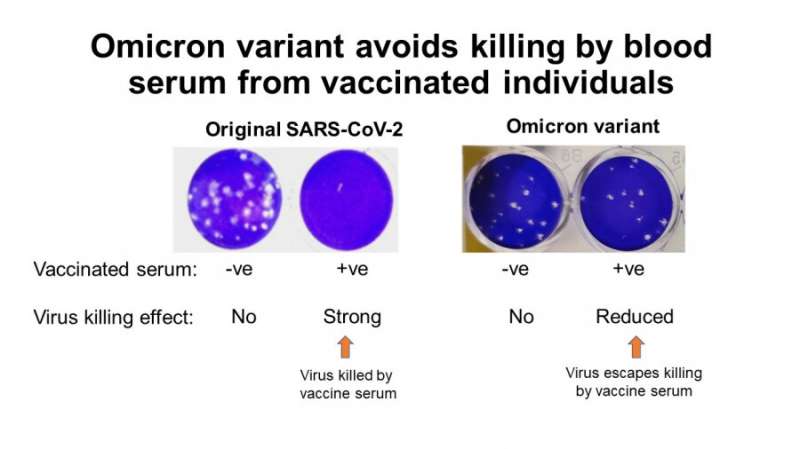

A recent study jointly conducted by the LKS Faculty of Medicine, The University of Hong Kong (HKUMed) and the Faculty of Medicine, The Chinese University of Hong Kong (CU Medicine) has revealed that Omicron, the latest COVID-19 variant, can significantly reduce the virus neutralization ability of Pfizer BioNTech (BNT162b2) vaccine by 32 folds or more. A similar test of another vaccine used in Hong Kong, CoronaVac, is being conducted and the results will soon be available.
However, vaccines are still likely to be effective in protecting against death and severe disease. The research team thus renewed calls on high-risk groups, such as the elderly and those with immunocompromised conditions or other chronic diseases to get booster doses as soon as possible.
Background
COVID-19 continues to pose major threats to global public health. The emergence of the Omicron virus variant is of great concern because it has more than 35 mutations in its spike protein, which suggests that the newly emerged variant has capacity to escape immunity from past infection or from vaccines. But direct data on escape from vaccine immunity is still awaited.
Testing the blood of people vaccinated with COVID-19 vaccines for ability to kill virus in the test tube (called the virus neutralization test) is one way to establish how well these vaccines protect against symptomatic infection.
Previous studies carried out by Professor David Hui Shu-cheong, Stanley Ho Professor of Respiratory Medicine and Chairman of Department Medicine and Therapeutics, CU Medicine have followed up people vaccinated with the two vaccines used in Hong Kong, Pfizer BioNTech (BNT162b2) and CoronaVac. Results of these studies have been published recently in the journal Respirology.
Research methods and findings
Professor Malik Peiris, Tam Wah-Ching Professor in Medical Science and Professor of Virology at the School of Public Health, HKUMed and Managing Director, Centre for Infection and Immunity (C2i), Hong Kong Science and Technology Park and his team isolated the Omicron variant and carried out the virus neutralization tests to measure virus killing antibody in the serum to the Omicron variant compared with the original SARS-CoV-2 virus.
In the recent initial experiments on Omicron variant, the blood of 10 people vaccinated with two doses of the Pfizer BioNTech (BNT162b2) vaccine was tested against the original SARS-CoV-2 virus from 2020 and the Omicron variant that the School of Public Health, HKUMed isolated from the first Hong Kong case.
The blood tested was collected one month after the second dose of the vaccine, the time when the highest level of virus-killing antibodies in the blood was expected.
“We can see that most individuals had high levels of virus killing (neutralization) activity against the original SARS-CoV-2 but this ability was markedly reduced by 32 folds or more against the Omicron variant,” said Professor Peiris. He added that these findings suggest that vaccine-protection against breakthrough infection with Omicron will be much reduced.
The data from CoronaVac vaccinated individuals will also soon be available but because previous studies suggested that virus-killing antibody levels in CoronaVac vaccines were lower than with the BioNTech vaccines, it is very likely that the loss of activity against CoronaVac will also be very large.
Professor Hui has pointed out that antibodies are one (though important) arm of the immune response. The second arm of the immune response is cell mediated immunity and this is less likely to be affected by the Omicron variant. “We may expect that vaccines may still have protective effect against severe disease and death. It is therefore important that all those who are eligible for vaccination get fully vaccinated,” he said.
Source: Read Full Article